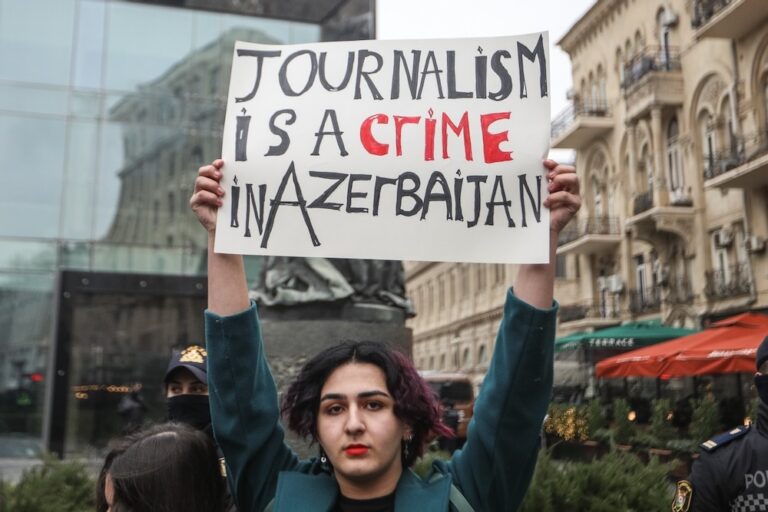The Institute for Reporters’ Freedom and Safety believes that recent amendments to the criminal code serve the purpose of having a chilling effect on critical bloggers and online activists, thus making citizens less active in the year of election.
The Institute for Reporters’ Freedom and Safety (IRFS) resolutely condemns the adoption of draconian amendments to the criminal code that allow for harsh penalties for defamation and insult posted on the Internet.
IRFS believes that the hasty adoption of this bill serves the purpose of having a chilling effect on critical bloggers and online activists, thus making citizens less active in the year of election.
“Amendments to the criminal code, which were passed today by the Parliament, were a blatant political move and a shabby attempt to hijack online freedoms amid [a] mounting pre-election crackdown”, comments IRFS CEO and chair, Emin Huseynov.
IRFS considers that using the criminal justice system to punish journalists and bloggers for freely expressed views is contrary to Azerbaijan’s constitution and international obligations, and has a chilling effect on journalists throughout the country.
IRFS recalls that the government has committed (through, inter alia, the “National Action Program for increasing the efficiency of human rights and freedoms in the Republic of Azerbaijan”) to an end to criminal defamation laws which encourage self-censorship.
IRFS therefore urges the Azerbaijani president to refrain from approving these amendments, as they are incompatible with the National Action Program for increasing the efficiency of human rights and freedoms.
The UN Human Rights Committee, the independent body of experts that provides the definitive interpretation of the International Covenant on Civil and Political
Rights (ICCPR), has said that “defamation laws must be crafted with care to ensure that they… do not serve, in practice, to stifle freedom of expression.… States parties should consider the decriminalization of defamation and, in any case, the application of the criminal law should only be countenanced in the most serious of cases and imprisonment is never an appropriate penalty”.
Azerbaijan is a state party to the ICCPR and is bound by its provisions.
The right to freedom of expression and information is guaranteed and protected by the provisions of international instruments, and treaties signed and ratified by the Government of Azerbaijan, notably the Universal Declaration of Human Rights (UDHR), Article 19, the International Covenant on Civil and Political Rights (ICCPR), Article 19, and Council of Europe Convention on Human Rights, Article 10.
IRFS calls on the Azerbaijani authorities to live up to the standards and commitments reflected in the European Convention of Human Rights, the Helsinki Accords, the International Covenant on Civil and Political Rights, and the Universal Declaration of Human Rights.
Toward that end, IRFS urges the government of Azerbaijan to repeal the laws that would constrict fundamental freedoms and human rights.
IRFS further calls on the international community, in particular the Council of Europe and the OSCE, to take a stronger stance and exert greater pressure on the
Azerbaijani authorities to fulfill their international human rights obligations.


